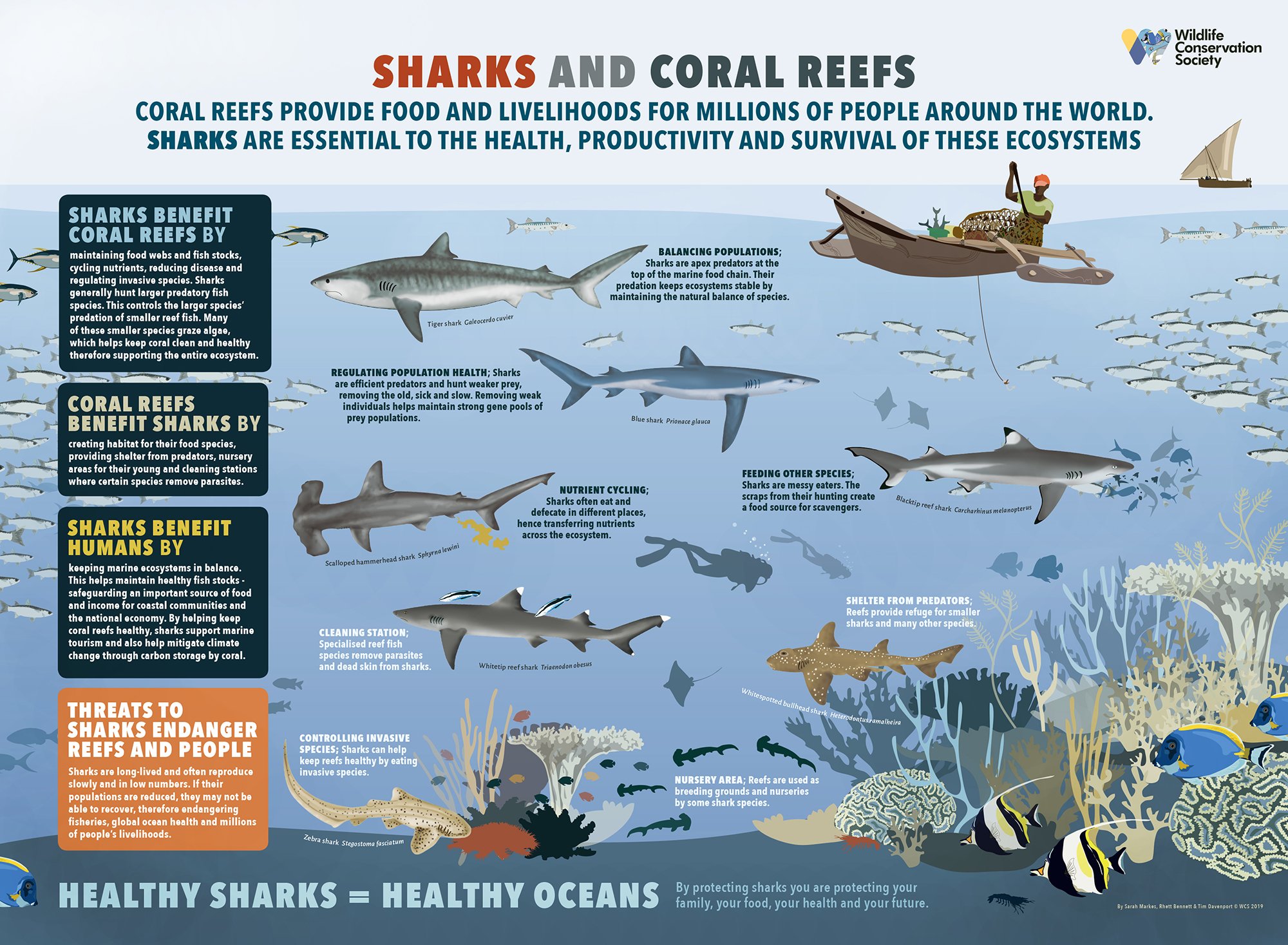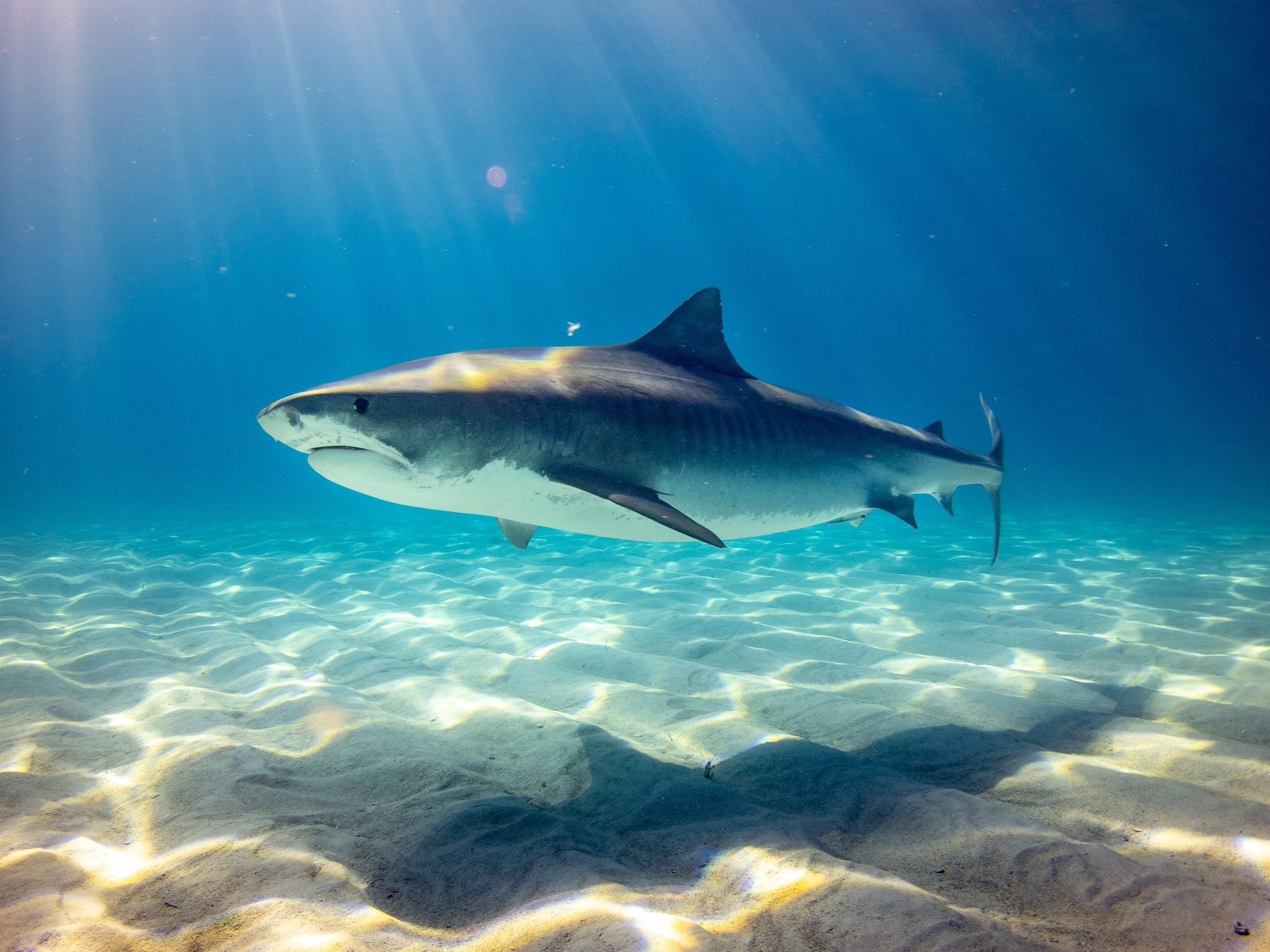The Ocean Needs Sharks and We Need the Ocean
The extinction of sharks would impact the environment and economy on a global scale. Ecosystems are finely tuned systems that are based on many species. All members play an integral role. The top predators are critical in keeping ecosystems in balance. The ocean needs apex predators. A natural balance is nearly impossible to recreate once it has been destroyed. Because sharks are very slow to mature and will only have a small number of pups a year (or every other year), population sizes of sharks don’t recover easily once they have been decimated, unlike other schooling fish such as tuna, which hatch thousands of eggs every year. It is estimated that even if all commercial fishing were to cease, many of the large sharks may not recover within 50 years, if ever. As apex predators, sharks are not equipped to withstand predation themselves and are highly vulnerable to exploitation. Like them or not, the ocean needs sharks and we need the ocean. Here’s why:
White Blood Cells.
Sharks stop disease from spreading by preying on the sick and dying. They keep populations strong and vibrant by taking out the weak and slow. Sharks are the major driving force behind natural selection in the ocean realm. Their presence often dictates behavior of other species, which in turn regulates how reef fish, sea turtles and other grazers behave. And that has consequences in how healthy reefs and seagrass beds are maintained (more on this later!). There is no other animal, including humans, that can do the job sharks perform so perfectly. Sharks and rays have evolved into roughly 500 different species, each of them adapted and specialized to function in a particular niche and layer of the ocean world.
Population Police.
Fish stocks that we like to catch and that all of us count on for food, also need sharks. It may seem counterintuitive to see a predator as anything else than competition. After all, they eat the fish we want to catch, right? Wrong! For example, without the control of sharks, populations of smaller predators can rapidly increase, which may seem like a good thing for people that want to catch more fish. However, the problem is that the consequence of too many small hunters can cause the opposite effect. They may eat too many reef fish, which are also priced as food fish. And without reef fish that graze on coral reefs, algae can quickly overtake the reef. Coral polyps die when covered by algae. The reefs are the birthplace for most fish, even the pelagic ones like tuna. No reef, no fish, no fishing. Additionally, once the smaller predators have depleted their own food source their numbers will drastically diminish as well. The end result is no one wins. This is just one example of how the system gets disrupted by taking away the top predator. The food chain needs all links intact.
Carbon Sequesters.
Well, kind of. Much like the coral reef scenario illustrated previously, Tiger Sharks are playing a key role in combating carbon by patrolling their favorite ecosystem for their favorite sea turtle meals: seagrass meadows. Seagrass is food for green sea turtles, manatees, parrotfish, sea urchins and many more. Flourishing seagrass meadows store twice as much CO2 per square mile as terrestrial forests. Yes, you read that right, TWICE! It sounds upside-down and inside-out, but in the long run, the presence of a predator, the tiger sharks, is actually beneficial to the prey, the sea turtle. The mere fact that a tiger shark swimming into the seagrass shallows, spooking the overgrazing sea turtles, preserves seagrass to capture and store more CO2.
“Even if shark populations are restored to more abundant numbers, their contribution to carbon sinking and mitigation will be just one small part in the effort to curb climate change. But sharks' abundance has an undeniable ripple effect on the many marine ecosystems that rely on healthy, plentiful seagrass in one way or another. By leveling the ecological playing field, sharks are fortifying these ecosystems against the threat of climate change, so they can live to sink carbon another day.” BBC’s Allison Hirschlag.
Economy Boosters.
To most, what was touched on above is enough of an argument to protect sharks from overfishing. Unfortunately, capital matters more than sustainability, in most cases. Lucky for conservationists, that is exactly where we can find a much more powerful argument to protect sharks. Looking from a purely economic point of view, not only do they keep commercially viable fish species healthy, but they are also the drivers of dive and eco-tourism industries that far outperform any commercial fishing gains. The undeniable appeal of sharks is fueling economies that make use of the animals as a renewable resource that amounts in the hundreds of thousands of dollars per shark over its lifetime and benefiting whole communities. A shark that is being fished and killed only brings in a one-time profit of a couple of hundred dollars at most. If we want to save sharks, we must see them as more than a collection of body parts, meant to be chopped up and sold for soup, meat, or cosmetics. The value of the global trade in shark products is estimated at $1B per year. In contrast, the global shark diving industry generates $314M per year. This is expected to double within the next 20 years, generating more than $780M per year. Add to that the value of sharks in film, TV, and news media, and these industries alone more than match commercial fishing income. If we were to put a number on the ecosystem services sharks provide to us, their value would be in the tens of billions every year. Shark Allies is tackling the valuation of shark populations this year, stay tuned for more!
Diety Status.
Sharks are not only important to our planet, but to the many cultures around the world that hold the species as a deity, a symbol and a North Star. Last year for Earth Day, we dove into the stories of Pacific Islanders and their close connection to the blue planet. They live in an environment that is ruled by the sea. It is a part of their everyday life as they depend on it for food, transportation and survival. Traditions and beliefs reflect this interconnectedness. Sharks play an important role in most Pacific Island cultures and often hold a significant status as a deity, as a manifestation of ancestors, or as a guide to voyagers and fishermen. There are many similarities in stories told across the Pacific. Many of the stories are sacred and are not openly discussed as it is considered to be disrespectful. The interpretations can vary from tribe to tribe and family to family, and it is difficult to present this information in a way that will do it justice. What is important about these stories and beliefs is that it shows us that there is a different way of relating to sharks and the ocean, where humans live in harmony and not in domination of nature, where wild animals are admired and accepted and where the utmost respect is given to the forces of the ocean. And this is not some mythical lost civilization - this is alive and strong in the Pacific Islands. We believe this is one of the reasons why the small countries of Oceania (Pacific Islands) are currently making the biggest strides in shark conservation and are putting the large, developed Nations to shame. Click this link for some interesting articles. Of course this serves only as a general impression of the topic as much of this knowledge will not be available online.






